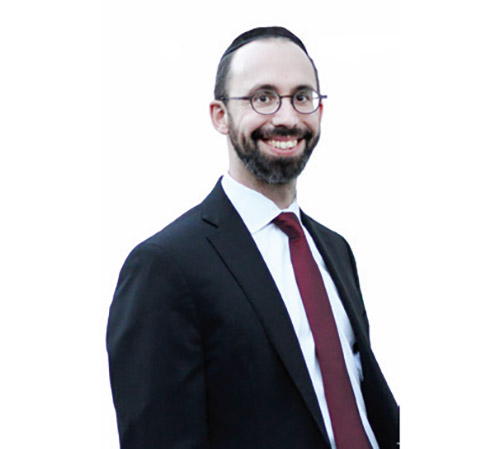
The Shabbos before Pesach is called Shabbos Hagadol, the great or large Shabbos. How is this Shabbos different from every other Shabbos?
At a bris, we give the newborn baby the blessing of “zeh hakatan gadol yihyeh, this baby shall be a gadol.” Simply put, we are referring to becoming a bar mitzvah at age 13. The Shulchan Aruch refers to a girl of 12 or boy of 13 as a gadol, since they no longer are minors.
Are we then just blessing the newborn baby to become an adult? What does it really mean to be a gadol?
The Sfas Emes explains that a bar/bat mitzvah is called a gadol because they receive a new neshama (soul) at that time. Although the yetzer hara/evil inclination enters a person when they are born, the yetzer tov/good inclination only enters when they become 13/12. This is why they are now considered a gadol—because they now have a yetzer tov! The new neshama makes them great. Similarly, the Shabbos before Pesach is called Shabbos Hagadol because on the eve of leaving Egypt klal Yisrael received their new neshama, and each year at this time we receive this extra dimension of self.
The Gemara Beitza tells us that every Shabbos we receive a neshama yeseira, an extra neshama. What does that mean? Are we more alive on Shabbos? The Sfas Emes explains the extra neshama gives us the ability to sense and experience both Hashem’s existence and our purpose in life. That’s when we become a gadol: when we experience a more expansive neshama. On Shabbos Hagadol we receive an extremely expansive and powerful ability to experience the miraculous ways Hashem dealt with us in Yetzias Mitzrayim (leaving Egypt).
We learn this idea of a Shabbos neshama from the words in Mishpatim (13:17), where it states that in six days Hashem created the heaven and earth, and “b’yom hashevi’i shavas (on the seventh day He rested) vayinafash.” The word vayinafash is a hybrid of three words, vay avdah nefesh, woe, we have lost our soul. This teaches us that at the end of Shabbos we lose a soul. Hence, we infer that at the beginning of Shabbos we receive an extra neshama. (Gemara Beitza)
The wording here is a little troubling. We start observing Shabbos with the expectation of losing a soul when Shabbos is over? Why the sobering tone? Why not just say that when Shabbos begins, we get an extra soul for the day? It sounds much more positive…
I heard a remarkable answer from Rabbi Dr. Akiva Tatz in the name of the Baal Shem Tov. Getting a message that we’re getting an extra neshama for the next 25 hours is uplifting. But it must be tempered with a warning to use it properly
My rosh yeshiva, Rabbi Nosson Tzvi Finkel, zt”l, was stricken with Parkinson’s. He had a chavrusa with a young man each Shabbos afternoon right after lunch. After a short while, the young man would often start to feel drowsy and fight to keep himself awake. He always marveled how the rosh yeshiva, despite the Parkinson’s, would not even put his head down. One Shabbos, he mustered the courage to inquire, “Rebbe, how is it that you learn Torah the entire afternoon and never seem to tire?” Rabbi Finkel replied, “Every Shabbos I receive an extra neshama. After Shabbos, it will return to Hashem to report. Hashem will ask, ‘What did you do for the 25 hours with the extra neshama I placed in you, Nosson Tzvi?’ I do not want the answer to just be that I ate chicken soup, kugel, cholent and slept. I want to take advantage of every moment I have with it, to return the neshama back to Hashem with accomplishment!”
On Shabbos Hagadol we receive and should feel a super-charged sense of purpose to connect to Pesach. This feeling will leave after Pesach. We need to absorb the lesson of vayinafash, to properly utilize every moment we have with our extra neshama. Use it to understand and relay the miracles of Yetzias Mitzrayim to our families. Use it to daven and study more Torah. We can then return that neshama to Hashem with a “mission accomplished.”
A Torah leader is referred to with the title “gadol.” In truth, we all have areas where we excel and can be a gadol. Let’s use our greatness and the extra sense of mission we receive from this Shabbos and from Pesach and apply it to our lives forever. When we find and use that which is gadol in ourselves, we will become true gedolim, true giants.
By Rabbi Baruch Bodenheim
Rabbi Baruch Bodenheim is the associate rosh yeshiva of Passaic Torah Institute (PTI)/Yeshiva Ner Boruch. PTI has attracted people from all over northern New Jersey, including Teaneck, Bergenfield, Paramus, Rockaway and Fair Lawn. He initiated and continues to lead a multi-level Gemara learning program. Recently he has spread out beyond PTI to begin a weekly beis midrash program with in-depth chavrusa learning in Livingston and Springfield. This year he joined Heichal Hatorah in Teaneck as a Gemara iyun rebbe. His email is [email protected].













